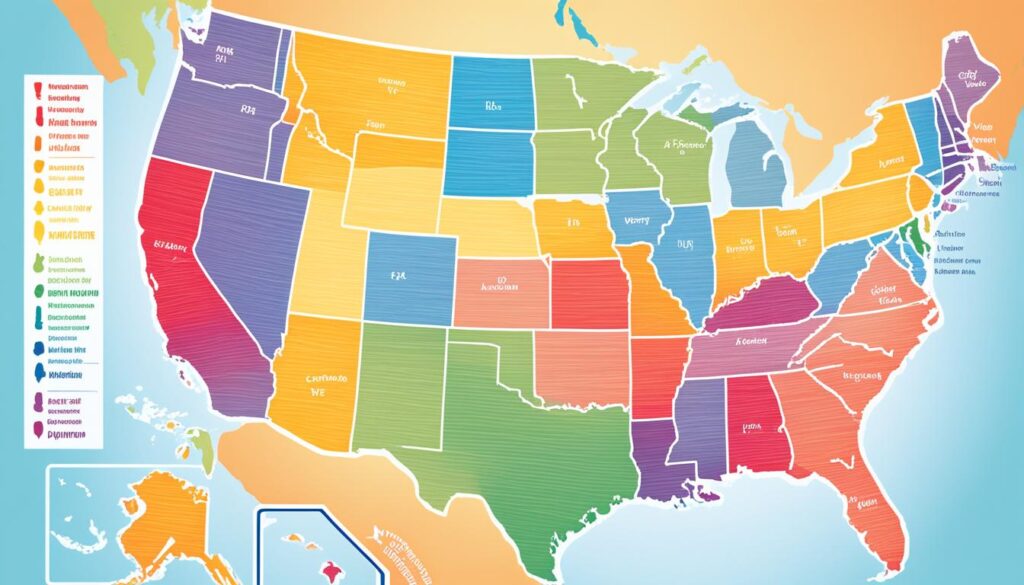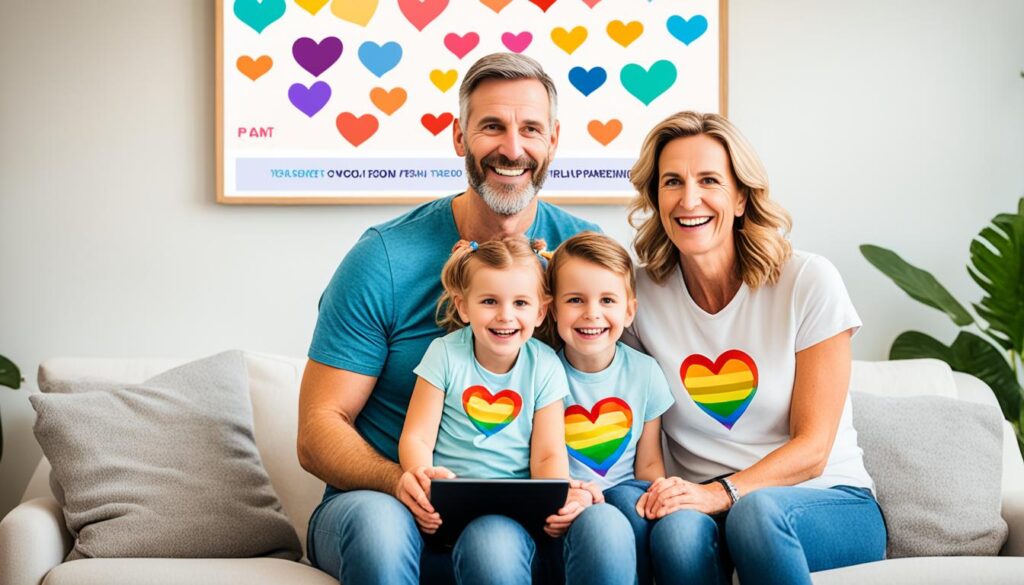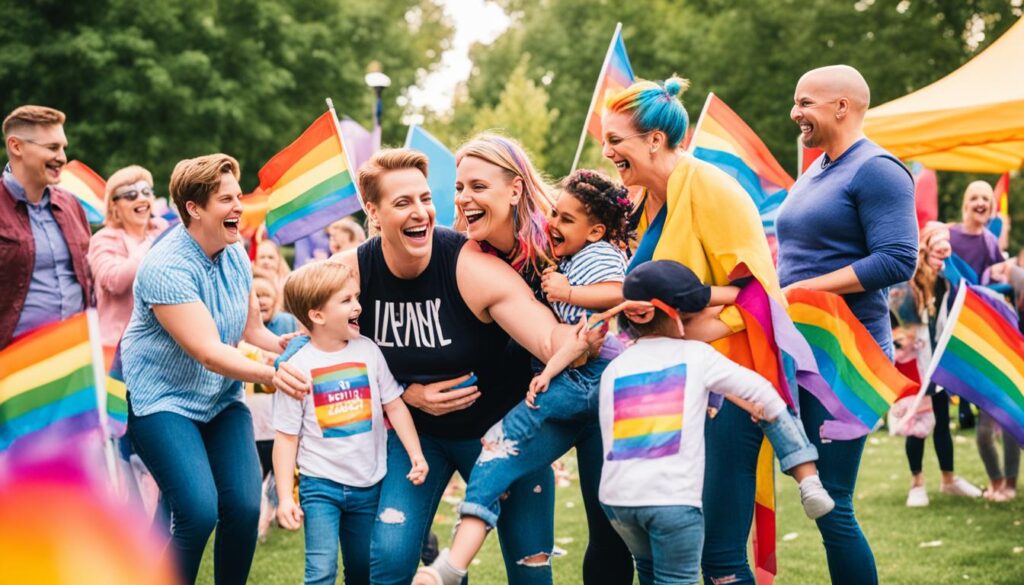LGBTQ+ parents are facing unique challenges in the digital age. With the rise in anti-trans and anti-LGBTQ legislation, creating a safe space for children to navigate their identities has become more crucial than ever. How can LGBTQ+ parents overcome these challenges and find support and acceptance in the modern digital landscape?
In the age of social media and online communities, many LGBTQ+ parents are turning to digital platforms to connect with others who share their experiences. These online spaces provide a safe haven where parents can seek advice, share their stories, and find support. However, despite these digital resources, there is still progress to be made in terms of visibility and acceptance for LGBTQ+ families.
Key Takeaways:
- LGBTQ+ parents face unique challenges in the digital age.
- Creating a safe space is crucial for children to navigate their identities.
- Online communities and resources provide support for LGBTQ+ parents.
- Visibility and acceptance for LGBTQ+ families still need improvement.
- Support and understanding from society are essential for LGBTQ+ parents and their families.
The Importance of Safe Spaces and Acceptance
LGBTQ+ parents understand the importance of creating safe spaces for their children to explore and express their identities. These spaces provide a supportive environment where children can freely embrace their true selves and find acceptance.
Many schools, such as The Harker School in San Jose, California, recognize this need and have taken steps to establish LGBTQ+ clubs and support groups. These initiatives play a crucial role in fostering a positive and inclusive atmosphere within educational institutions, ensuring that LGBTQ+ children have access to the support they need.
“Creating an environment where everyone feels safe, respected, and included is a top priority for us,” says Jane Doe, Principal at The Harker School. “Our LGBTQ+ clubs and support groups not only provide a safe space but also promote understanding, empathy, and allyship among our students.”
In recent years, increased acceptance has been observed among young people, leading to a more normalized view of queerness. However, challenges and prejudices still persist, making it essential for LGBTQ+ parents to continue advocating for the rights and well-being of their children.
Creating Supportive LGBTQ+ Communities
The importance of LGBTQ+ communities cannot be overstated. These communities serve as pillars of support, providing resources, guidance, and a sense of belonging to LGBTQ+ parents and families.
Online platforms, such as LGBTQ+ parenting forums and social media groups, offer opportunities for LGBTQ+ parents to connect and share their experiences. These spaces not only provide a sense of community but also enable parents to access valuable information, advice, and support from individuals who have faced similar challenges.
Through these communities, LGBTQ+ parents can find solace, establish meaningful connections, and gain the strength to navigate the changing social landscape. By fostering a sense of solidarity, LGBTQ+ communities play a vital role in empowering individuals and building a more accepting society for all.
Addressing the Need for Acceptance
While progress has been made in terms of LGBTQ+ rights and acceptance, it is crucial to recognize that there is still work to be done. LGBTQ+ parents continue to face various challenges, including discrimination, prejudice, and limited access to resources.
By advocating for their children’s rights and openly discussing LGBTQ+ parenting, parents contribute to raising awareness and promoting acceptance in society. It is through these efforts that we can build a more inclusive world, where LGBTQ+ parents and their children can thrive without fear of discrimination or judgment.
The Role of Online Communities
The internet has revolutionized the way LGBTQ+ parents connect and find support. Online communities and social media platforms have become valuable spaces for individuals to seek acceptance, share experiences, and receive support from like-minded individuals. This virtual network has created a sense of belonging and has significantly contributed to reducing isolation for LGBTQ+ parents and their families.
Through online communities, LGBTQ+ parents can navigate the unique challenges they face by exchanging advice, resources, and stories. Online platforms provide a safe environment where individuals can find people who share similar experiences and understand the nuances of LGBTQ+ parenting.
“Online communities give me a sense of community and acceptance that I might not find offline. It’s comforting to know that I’m not alone in this journey and that there are others who can relate to my experiences.” – Sarah, LGBTQ+ parent
In addition to emotional support, these virtual spaces also serve as a platform for advocacy and empowerment. LGBTQ+ parents can join forces to advocate for policy changes, challenge stereotypes, and fight discrimination. Online communities offer a stage for visibility and resilience, creating a strong collective voice for LGBTQ+ parenting rights.
However, when engaging with online communities, it is important to exercise caution and prioritize privacy and safety. LGBTQ+ parents should be mindful of sharing personal information and be aware of potential risks associated with online interactions. It is crucial to practice digital safety measures and verify the authenticity of online groups and individuals before disclosing personal information.

Navigating Laws and Policies
Despite the significant progress made in LGBTQ+ rights, there is still a concerning number of laws and policies that specifically target LGBTQ+ youth and families. In fact, as recent as 2023, over 550 anti-LGBTQ+ bills were introduced in state legislatures, revealing an ongoing battle for equality and acceptance. As a result, LGBTQ+ parents face the challenging task of navigating through the complex and ever-changing legal landscape.
“The existence of discriminatory laws and policies poses a significant barrier to LGBTQ+ parents seeking to provide a safe and inclusive environment for their children. These legal obstacles perpetuate discrimination and hinder the progress we have made in achieving equality.”
Organizations such as Family Equality recognize the importance of providing resources and information to empower LGBTQ+ parents in their journey to navigate these discriminatory laws and policies. By offering a comprehensive understanding of legislation and its impact on LGBTQ+ families, Family Equality equips parents with the knowledge they need to advocate for their rights and the well-being of their children.
Legislation Affecting LGBTQ+ Parenting
It is crucial for LGBTQ+ parents to educate themselves on the specific legislation that directly impacts their rights and well-being. This includes understanding the intricacies of adoption laws, parental recognition, custody battles, and healthcare access for both parents and children.
Here are a few examples of legislation that LGBTQ+ parents commonly encounter:
- Parental Recognition: Laws that determine legal recognition of LGBTQ+ parents, including second-parent adoption, stepparent adoption, and de facto parentage.
- Adoption and Foster Care: Laws that regulate LGBTQ+ individuals’ ability to adopt children, become foster parents, or provide safe and loving homes for children in need.
- Healthcare Access: Laws that affect access to healthcare for LGBTQ+ parents and their children, including insurance coverage, medical decision-making, and discrimination protections.
- Education and School Policies: Laws that impact LGBTQ+ parent involvement in their children’s education, school policies regarding LGBTQ+ inclusivity, and bullying prevention.
Understanding these laws and staying informed about any updates or changes is crucial for LGBTQ+ parents seeking to protect their families and ensure their legal rights are upheld.
Advocacy and Mobilization
Through education, advocacy, and mobilization efforts, LGBTQ+ parents are working towards a future where their rights and the well-being of their children are protected. By collaborating with organizations like Family Equality, LGBTQ+ parents have access to a network of support, legal guidance, and resources to navigate the legal landscape while actively working towards positive change.
The fight for equality goes beyond individual families—it extends to the broader LGBTQ+ community. By joining forces with other LGBTQ+ parents, activists, and allies, LGBTQ+ families can collectively challenge discriminatory laws and policies and demand fair treatment and equal rights for all.

| Legislation | Impact |
|---|---|
| Parental Recognition | Determines legal recognition of LGBTQ+ parents, affecting parental rights, adoption, and custody. |
| Adoption and Foster Care | Regulates LGBTQ+ individuals’ ability to adopt or foster children, impacting the creation of safe and loving homes. |
| Healthcare Access | Affects access to healthcare for LGBTQ+ parents and their children, including insurance coverage and medical decision-making. |
| Education and School Policies | Impacts LGBTQ+ parent involvement in education and school policies related to LGBTQ+ inclusivity and bullying prevention. |
By understanding these laws and actively engaging in advocacy efforts, LGBTQ+ parents are becoming agents of change, pushing for comprehensive legal protections for all LGBTQ+ families.
Remaining informed, empowered, and resilient in the face of discriminatory laws and policies is essential for navigating the complexities of LGBTQ+ parenting. It is through education, support, and a shared commitment to equality that LGBTQ+ parents can create a safer and more inclusive future for themselves and their children.
Inclusive Children’s Books
LGBTQ+ parents understand the importance of providing their children with inclusive books that represent the diversity of LGBTQ+ families. These books play a vital role in fostering a sense of belonging, promoting acceptance, and celebrating different identities. Here at Family Equality, we curate an up-to-date list of inclusive children’s books that depict LGBTQ+ families in a loving and respectful manner.
By offering these books to their children, LGBTQ+ parents can provide them with stories that reflect their own experiences and identities. Representation matters, and inclusive children’s books allow children to see themselves and their families depicted positively in literature. It helps them develop a sense of pride and confidence in who they are.
Our curated list covers a wide range of themes, from same-sex parents to transgender and non-binary individuals. These books promote understanding, empathy, and diversity among children and provide a window into the lives of LGBTQ+ families. Through these stories, children learn about love, acceptance, and the importance of respecting others’ differences.
Reading inclusive children’s books is not only beneficial for LGBTQ+ families but also for all children. It encourages them to embrace diversity, challenge stereotypes, and build a more inclusive society.
Here’s a sample of some of the inclusive children’s books you can find on our list:
| Title | Author | Illustrator |
|---|---|---|
| And Tango Makes Three | Justin Richardson | Peter Parnell |
| Julián is a Mermaid | Jessica Love | Jessica Love |
| Heather Has Two Mommies | Lesléa Newman | Diana Souza |
| Introducing Teddy | Jess Walton | Dougal MacPherson |

Remember, exposure to diverse stories is crucial in promoting acceptance and understanding among children. By embracing inclusive children’s books, we can create a more inclusive and welcoming world for all families.
Parenting Trans Youth
Parenting trans youth requires additional education and support. LGBTQ+ parents of trans youth must navigate medical appointments, school environments, and societal attitudes. Supporting trans youth often means becoming advocates for their rights and challenging harmful policies and stereotypes.
“As parents of trans youth, we have to be their greatest allies. We need to educate ourselves, stand up for their rights, and create a safe and accepting environment,” says Sarah Thompson, parent and LGBTQ+ advocate.
Medical appointments play a crucial role in the journey of trans youth. From hormone therapy to gender-affirming surgeries, it is essential to find healthcare providers who specialize in transgender care. LGBTQ+ parents can consult organizations like Family Equality for guidance and resources in finding trans-friendly healthcare professionals.
In addition to healthcare, schools play a significant role in the lives of trans youth. It is essential for LGBTQ+ parents to engage with their child’s school, advocating for policies that support gender identity and inclusion. Organizations like the Gender Spectrum provide educational resources and guidance for parents navigating school environments.
“When my child came out as trans, I reached out to the school to ensure they had the necessary support systems in place. Being an advocate for my child and educating the administration has made a positive impact on their experience,” shares Alex Rodriguez, parent and LGBTQ+ activist.
Societal attitudes towards transgender individuals can be challenging, with discrimination and prejudice still prevalent. As parents, it is crucial to develop support networks both for ourselves and our trans children. Organizations like TransYouth Equality Foundation offer resources, support groups, and activities to connect LGBTQ+ parents of trans youth.
“By participating in LGBTQ+ advocacy and supporting organizations that uplift trans youth, we can create a more inclusive and accepting society for our children,” emphasizes Rachel Turner, parent and LGBTQ+ ally.
Trans Youth Parenting Resources
Here are some resources for LGBTQ+ parents navigating the unique challenges of parenting trans youth:
- TransYouth Equality Foundation: Provides resources and support for families of transgender youth.
- Gender Spectrum: Offers educational resources and support for parents navigating gender diversity.
- Family Equality: Connects LGBTQ+ parents and provides resources on various topics, including trans youth parenting.
Inspiring stories of parents and their trans youth have raised awareness and built bridges of understanding. “We must continue to support and uplift trans youth, ensuring they have the love and acceptance they deserve,” says Emily Martin, LGBTQ+ advocate.

LGBTQ+ Parents and Social Media
LGBTQ+ parents have found social media to be a valuable tool in their parenting journey. It allows them to connect with others, share experiences, and amplify their voices. Social media platforms provide a space for LGBTQ+ parents to seek support, celebrate milestones, and raise awareness about the unique challenges they face.
On social media, everyday posts can unintentionally become acts of advocacy, shedding light on the struggles and triumphs of LGBTQ+ families. By sharing their stories, LGBTQ+ parents not only create visibility for themselves but also serve as a source of inspiration and support for others. Through these platforms, they can detect disapproval, identify allies, and build a strong network of individuals who understand their experiences.
“Social media has allowed me to connect with LGBTQ+ parents from all over the country. We can share resources, offer advice, and lift each other up during challenging times. It’s like having a virtual support group at my fingertips,” says Sarah, a proud LGBTQ+ parent.
However, privacy and disclosure become complex issues for LGBTQ+ parents navigating social media. The line between sharing personal stories and protecting their family’s privacy can be blurry. It’s a collective responsibility shared with partners, children, and extended family members. LGBTQ+ parents carefully consider the disclosure of personal information and set boundaries to safeguard their privacy.
Disclosure and Privacy Boundaries
When it comes to disclosure, LGBTQ+ parents have the right to decide how much information they want to share publicly. They consider factors such as their child’s age and readiness, their family’s comfort level, and potential risks they may face due to discrimination or prejudice.
Privacy settings on social media platforms play a crucial role in maintaining control over the visibility of personal information. LGBTQ+ parents often utilize these settings to create a safe and private online space for their family. By carefully managing their profiles and controlling who can access their content, they can navigate social media while preserving their privacy.

Advocacy through Online Spaces
Beyond personal narratives, LGBTQ+ parents leverage social media as a platform for advocacy. They use hashtags, participate in online campaigns, and share informative content to raise awareness about LGBTQ+ parenting and promote inclusivity. Through these digital channels, they contribute to the larger movement for LGBTQ+ rights and acceptance.
Online spaces also provide opportunities for LGBTQ+ parents to engage in dialogue with policymakers, educators, and healthcare professionals. By sharing their experiences and insights, they can educate others and advocate for policy changes that benefit LGBTQ+ families.
As LGBTQ+ parents navigate social media, it is essential for them to strike a balance between sharing their stories, advocating for their rights, and safeguarding their privacy. By doing so, they contribute to the visibility and acceptance of LGBTQ+ families in the digital landscape.
Overcoming Obstacles and Discrimination
Despite the growing acceptance of LGBTQ+ families, obstacles and discrimination still persist. LGBTQ+ parents face unique challenges in various aspects of their lives, including limited access to adoption services and prejudice within healthcare and educational institutions.
One of the major obstacles faced by LGBTQ+ parents is the difficulty in accessing adoption services. Many LGBTQ+ individuals and couples encounter discrimination when attempting to adopt, facing biased regulations and unfair selection processes. This discrimination not only denies children loving homes but also perpetuates harmful stereotypes about LGBTQ+ parenting.
Discrimination in healthcare and educational institutions is another significant hurdle for LGBTQ+ parents. This discrimination can manifest in different ways, including misgendering and lack of inclusivity in healthcare settings, as well as biases and insensitivity in educational environments. These experiences can have a detrimental impact on the well-being and development of LGBTQ+ families.
“Discrimination against LGBTQ+ parents denies children loving homes and perpetuates harmful stereotypes.”
Despite these challenges, LGBTQ+ parents find strength and support in organizations like Family Equality. These organizations provide resources, information, and a sense of community for LGBTQ+ families, helping them navigate the obstacles they face.
In addition to seeking support, LGBTQ+ parents can engage in advocacy work to overcome discrimination and create a more inclusive society. By sharing their experiences, challenging biases, and working towards positive change, LGBTQ+ parents contribute to a more accepting and equal future for all.

The Shift in Social Movements
Social movements advocating for LGBTQ+ rights have made significant progress in recent years, leading to increased acceptance and recognition of LGBTQ+ families. One notable milestone was the legalization of same-sex marriage, which granted LGBTQ+ couples the same legal rights and privileges as heterosexual couples.
However, despite these advancements, discrimination and stigma towards LGBTQ+ individuals and families still persist. This ongoing bias highlights the importance of continued activism and advocacy work to ensure equal rights and opportunities for LGBTQ+ parents and their children.
The evolving landscape of social movements has also impacted how LGBTQ+ parents navigate their public and private identities. As societal attitudes shift, disclosure decisions become increasingly complex. LGBTQ+ parents must consider the potential consequences and reactions when deciding whether to disclose their family structure in various contexts.
“The ongoing fight for LGBTQ+ rights and recognition reminds us that progress is not always linear. It requires ongoing effort and collective action to challenge prejudice and create a more inclusive society for all.”
Recognizing the importance of LGBTQ+ parenting and the need for acceptance, many organizations, such as Family Equality, focus on providing support and resources for LGBTQ+ parents and families. By offering inclusive programs, educational materials, and community-building events, these organizations strive to create a more welcoming environment for LGBTQ+ families.
The Impact of Shifting Social Movements
The shift in social movements has had a profound impact on the experiences of LGBTQ+ parents. The increasing visibility and acceptance of LGBTQ+ individuals have created a more supportive environment for LGBTQ+ families. However, the fight for equal rights and recognition is far from over, and there is still work to be done to eradicate discrimination and prejudice.
By understanding the complexities of navigating public and private identities and supporting initiatives that promote acceptance, we can contribute to a more inclusive and understanding society for all families, regardless of their sexual orientation or gender identity.

In the next section, we will explore the various forms of support available for LGBTQ+ parents and families, including community resources and online networks.
Supporting LGBTQ+ Parents and Families
Providing support and resources for LGBTQ+ parents and families is crucial in creating an inclusive and welcoming environment. Organizations like Family Equality and online communities offer a wide range of tools, advice, and a strong sense of community for LGBTQ+ parents.
Family Equality, a leading organization dedicated to LGBTQ+ parenting, offers valuable resources to help navigate the challenges of LGBTQ+ families. Their website provides information on legal rights, parenting tips, and support networks, ensuring that LGBTQ+ parents have access to the resources they need.
“Family Equality has been a lifeline for my partner and me. Their support and guidance have helped us navigate the complexities of LGBTQ+ parenting and feel connected to a larger community that understands our unique experiences.” – Sarah, LGBTQ+ parent
In addition to organizations like Family Equality, online communities play a significant role in connecting LGBTQ+ parents and providing support. These communities offer a safe and welcoming space for parents to share their experiences, seek advice, and find validation in their parenting journey.
By fostering acceptance and providing inclusive resources, society can create a more supportive environment for LGBTQ+ families. It is essential for individuals and communities to champion equality and celebrate the diversity of families, ensuring that LGBTQ+ parents and their children feel supported and accepted.
Community Support and Engagement
Community support plays a vital role in the lives of LGBTQ+ parents and families. Engaging with local LGBTQ+ organizations, attending events, and participating in support groups can provide a sense of belonging and connection to others who share similar experiences.
Forming friendships and support networks with other LGBTQ+ families can provide a valuable support system, offering understanding, empathy, and practical advice. These connections help alleviate feelings of isolation and provide a space for LGBTQ+ parents to seek guidance and share their triumphs and challenges.
Additionally, LGBTQ+ parents can find support and community through online platforms, such as LGBTQ+ parenting forums, social media groups, and virtual meetups. These digital spaces offer a convenient and accessible way to connect with other LGBTQ+ parents around the world, regardless of geographical location, and gain valuable insights and perspectives.
Access to Resources and Education
Access to resources and education is crucial for LGBTQ+ parents to navigate the unique challenges they may face. From understanding legal rights and protections to accessing healthcare and educational resources, having comprehensive and inclusive information is essential.
Family Equality and other LGBTQ+ parenting organizations provide resources tailored specifically to the needs of LGBTQ+ families. These resources can include information on LGBTQ+ affirming schools, healthcare providers, and support networks. They also offer guidance on topics such as fertility options, adoption processes, and legal considerations.
By having access to these resources, LGBTQ+ parents can make informed decisions, feel empowered, and advocate effectively for themselves and their families. Additionally, educating allies, healthcare providers, and educators on LGBTQ+ parenting can help create more inclusive and welcoming environments for LGBTQ+ families.
Fostering Acceptance and Celebration
Creating an environment that fosters acceptance and celebrates the diversity of families is crucial for LGBTQ+ parents and their children. This can be done both on an individual level and at a broader societal level.
Open conversations about LGBTQ+ identities and families with children can help foster understanding and empathy among peers, educators, and community members. Teaching children about different family structures helps break down stereotypes and promotes acceptance from a young age.
Representation in children’s literature, media, and educational materials is also essential. Inclusive books, TV shows, and movies that feature LGBTQ+ families and LGBTQ+ individuals contribute to a more inclusive culture, where all families are celebrated and respected.
Building a Network of Support
Supporting LGBTQ+ parents and families requires a collective effort from individuals, communities, and organizations. By coming together, we can create a world where LGBTQ+ parents and their children can thrive and feel valued and supported.
Through organizations, online communities, access to resources, and fostering acceptance, we can build a network of support that uplifts LGBTQ+ parents and families and helps them navigate the unique challenges they face.

| Support Organizations | Website |
|---|---|
| Family Equality | familyequality.org |
| PFLAG | pflag.org |
| The Trevor Project | thetrevorproject.org |
Conclusion
LGBTQ+ parenting in the digital age brings both opportunities and challenges. Creating safe spaces, advocating for rights, and utilizing online resources are essential for navigating these unique challenges. By providing support, education, and acceptance, we can ensure a brighter future for LGBTQ+ parents and families.
Throughout this article, we have explored the importance of safe spaces and acceptance, the role of online communities, navigating laws and policies, finding inclusive children’s books, parenting trans youth, the impact of social media, overcoming discrimination, the shift in social movements, and supporting LGBTQ+ parents and families.
It is crucial to continue offering resources and support to LGBTQ+ parents and families in the digital age. By recognizing the challenges they face and providing the necessary tools, we can help them thrive and create a more inclusive and accepting society for all.
FAQ
What unique challenges do LGBTQ+ parents face in the digital age?
How can parents create a safe space for their children to explore and express their identities?
How can online communities and social media platforms support LGBTQ+ parents?
What challenges do LGBTQ+ parents face in navigating laws and policies?
Where can LGBTQ+ parents find inclusive children’s books?
How can LGBTQ+ parents navigate the unique challenges of parenting trans youth?
How do LGBTQ+ parents navigate privacy and disclosure on social media?
What obstacles and discrimination do LGBTQ+ parents still face?
How do shifting social movements impact LGBTQ+ parents?
Where can LGBTQ+ parents find support and resources?
How can LGBTQ+ parents navigate the challenges of parenting in the digital age?
Amina brings over a decade of journalism experience to her role as Editor-in-Chief. Under her leadership, Exquisite Post has flourished, maintaining the highest standards of integrity and excellence. Amina’s commitment to truth and her visionary approach guide the editorial team in producing impactful news stories that resonate with our audience.










